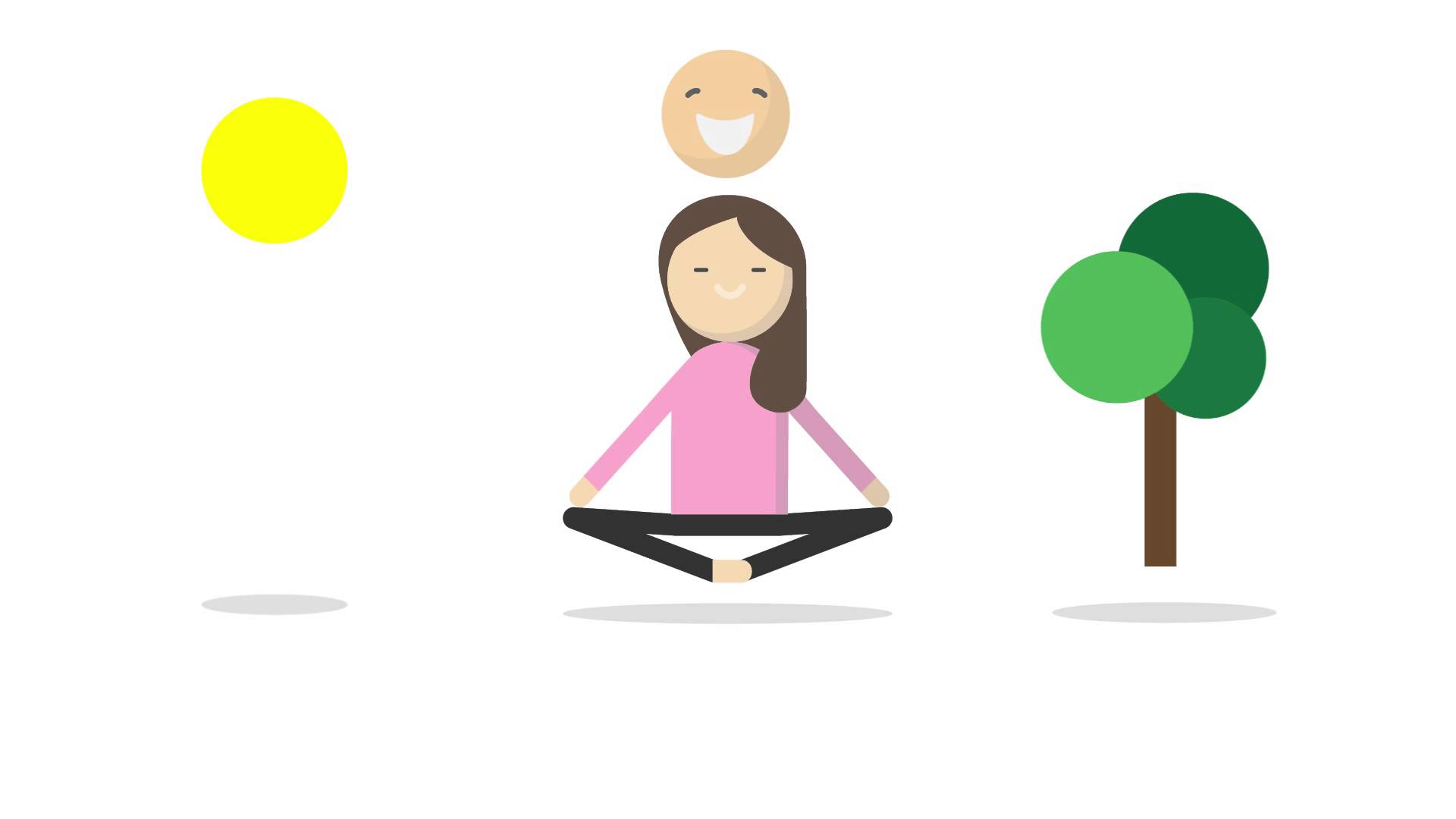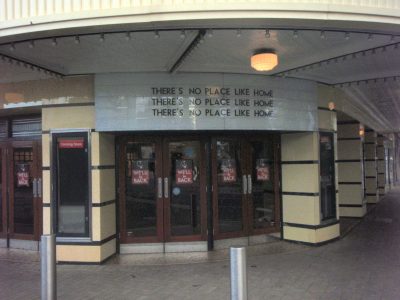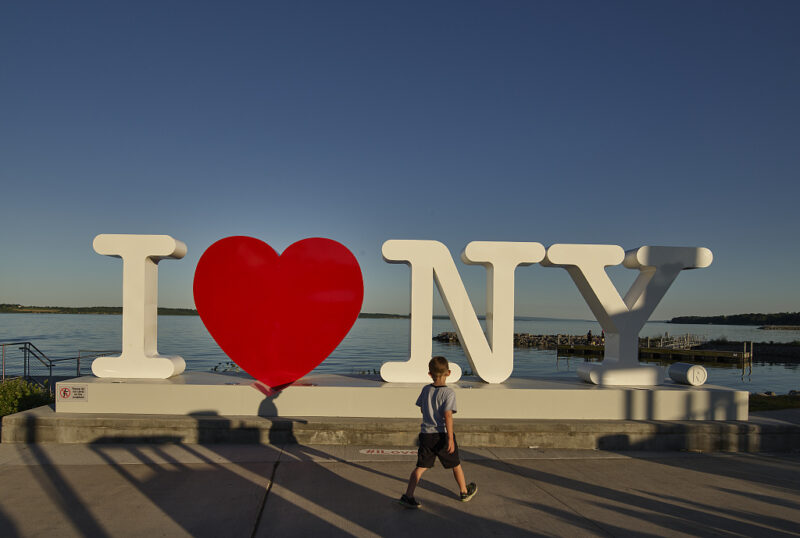South Australia – State of Mind (June 2020)
Square Holes has been tracking the financial and mental state of mind of South Australians via a representative survey of 400 adults each month from March to June. Most recent findings show South Australians have acclimatised to an improving COVID-19 situation. Economic confidence of South Australian’s has improved since March, yet now plateaued, and caution around financial security remains.
Below we explore the financial security of South Australians, and reveal how younger people are feeling far more buoyant for themselves, and others locally and beyond.
Confidence plateaus
41% of South Australians were confident looking towards the next year in the month of June, slightly down from the 6 year high, measured in May (46%), easing more inline with the average. A lack of confidence has consequently increased by 6% as optimism is somewhat tempered.

Confidence is highest amongst 35-49 year olds (50% confident in next 12 months) and lowest amongst South Australians aged 65+ (35%). When asked how confident they feel compared with one month ago, 33% indicating they feel more confident, with the level significantly higher for 18-34 year olds (44%) and lowest for 65+ year olds (23%).
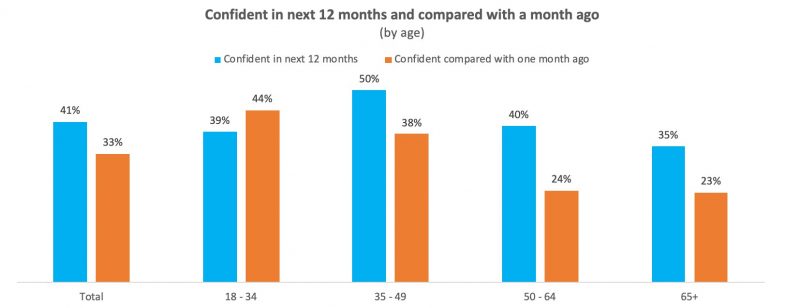
After comparative monthly confidence peaked in May, after a tough month of April, confidence in June has slightly subsided, with 27% indicating they have less confidence compared to a month ago (up 3%).
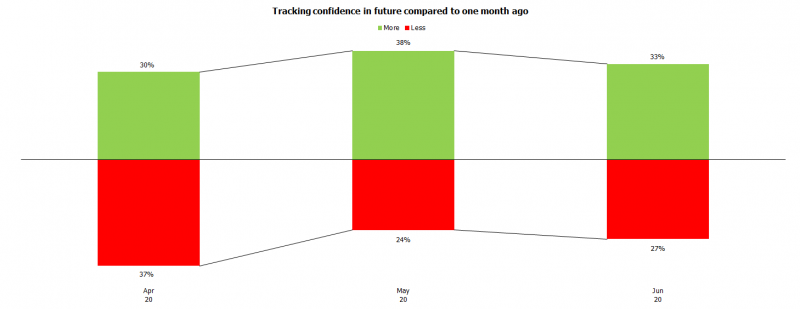
Financial security stabilises
Perceived financial security in 12 months’ time recovered in April, after observing a record low in March 2020. Since then, May and June have noted consistent measures for financial security, with only 23% and 22% (respectively) believing they are worse off financially.
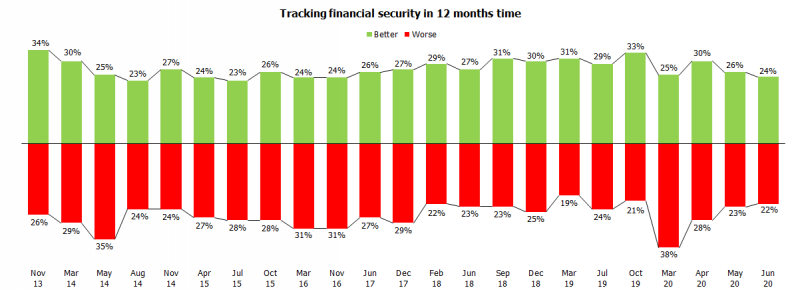
When we asked South Australian’s to look at thier financial security perceptions 12 months into the future, there was a notable increase in postive outlook compared to 2013/14 results. Perhaps an indication of the hard-hitting economic struggles experienced in the early months of 2020, with many perceiving their security has to improve from those lows.
Around one in five South Australians believe their financial security is better than 12 months ago. Smaller proportions believe the financial security of others is better than 12 months ago. There is a declining sense of financial security compared with 12 months ago as age increases, including personal security and that of others in SA, interstate and overseas.
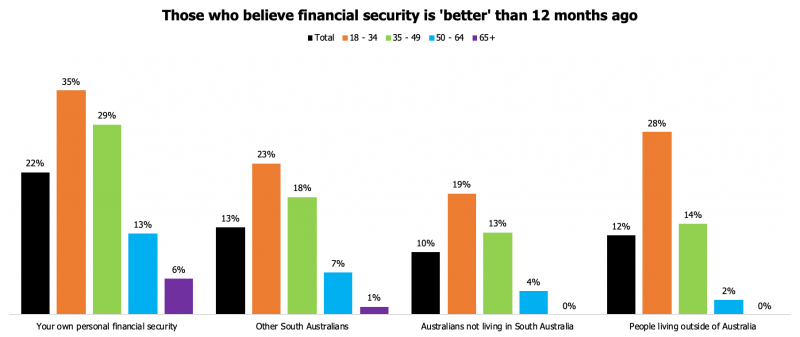
There is an age skew towards younger age groups feeling stronger personal financial security. Optimism bias, the tendency to feel, likely unrealistically, optimistic about one’s own situation, yet less optimistic towards others is likely illustrated in the survey data.
Regional South Australians have a stronger sense of financial security than those living in metropolitan Adelaide compared with 12 months ago.
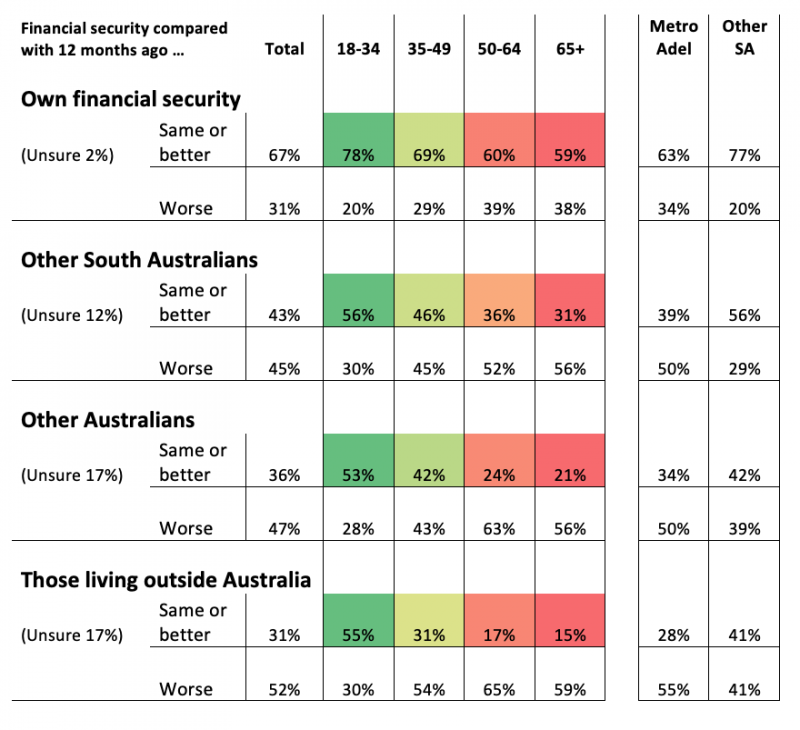
There is an appreciation that financial security locally and worldwide has declined over the past 12 months, particularly compared with benchmark findings from an identical Square Holes survey of South Australians in 2014.
While there is a decline in South Australians saying their own financial security is worse compared with the benchmark in 2014 – 38% to 31% in 2020, the proportion believing financial security is worse for other South Australians, and people living interstate and overseas has grown notably, especially ‘Australians not living in South Australia’ increasing from 20% indicating ‘worse’ in 2014 to 47% in 2020.
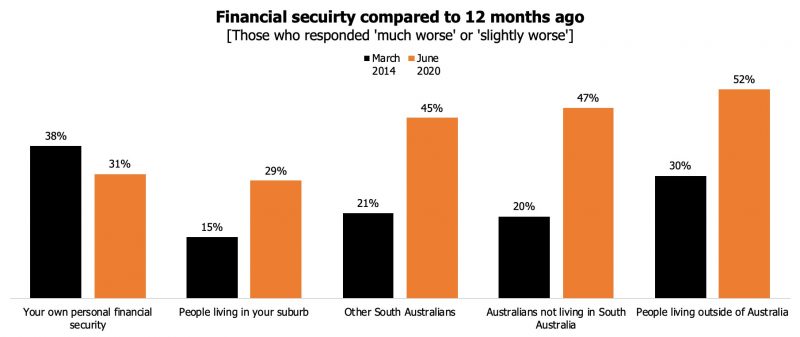
The majority of South Australians continue to believe they are in a worse position financially compared to 12 months ago [31%]. Whilst those perceiving they are better off has been gradually increasing over the last two months since the low in April.
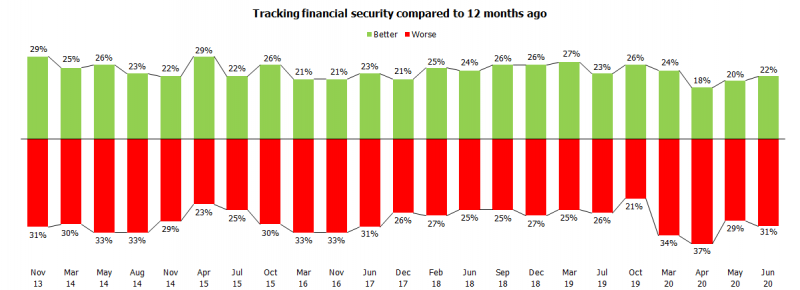
Younger South Australians again feel much more buoyant about the next 12 months than other South Australians. South Australians aged 50+ are less confident about the financial security of people living overseas than other age groups. Irrespective of age, a larger proportion believe financial security will be the same or better in 12 months than worse.
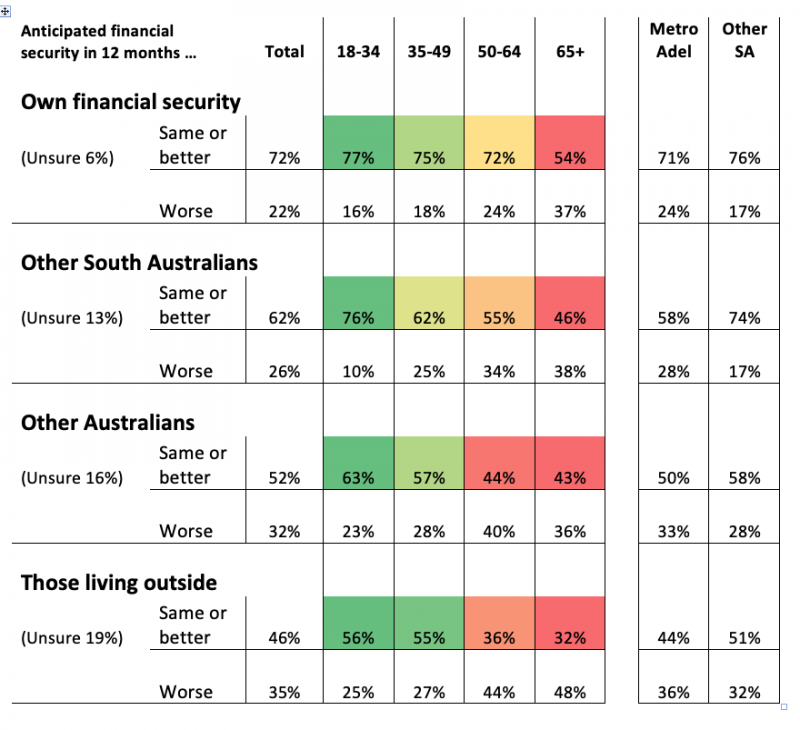
Younger South Australians are more optimistic about the financial security of themselves and others, with the clear majority believing that financial conditions will improve over the next 12 months. South Australians living in regional areas are also more financially confident than metropolitan Adelaide residents looking 12 months into the future.
South Australians aged 50 + are not only less confident about their own financial security in 12 months, but also the financial security of other South Australians, other Australians and people living overseas. For older age groups there is a larger proportion believing that financial security will worsen than those sensing it will remain the same or better.
Only one in twenty South Australians aged 65+ believe their financial security will be better in 12 months, compared with around one in three 18 to 49 year olds. There is a greater sense of financial optimism in younger South Australians, for themselves and others.
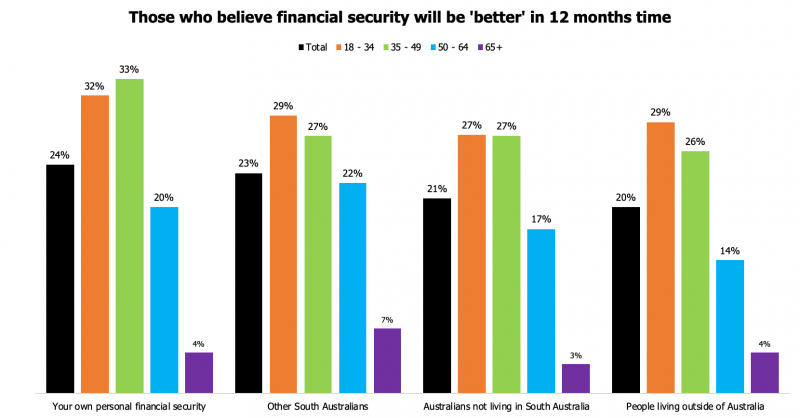
When compared against identical data collected in 2014, the percent saying that financial security will be better for themselves is slightly below the benchmark, while significantly above the 2014 levels for wider South Australia, interstate and overseas. The proportion of South Australians anticipating financial security to get worse is statistically identical to 2014, although indicates an anticipation of declining financial security overseas.
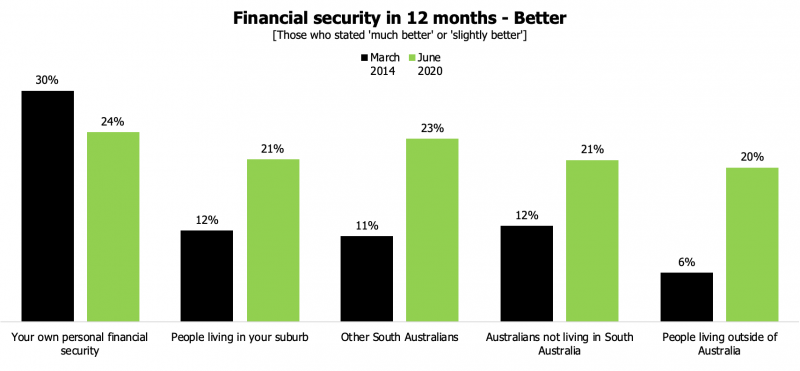
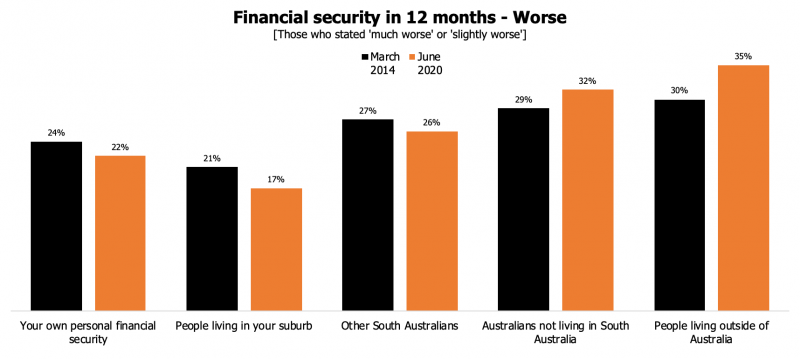
Mental health experiences a setback
Whilst measures of mental health showed continual improvement since March, June has noted some very minor increases, most notably those who ‘feel tired out for no good reason’ which has seen a 3% increase from May.
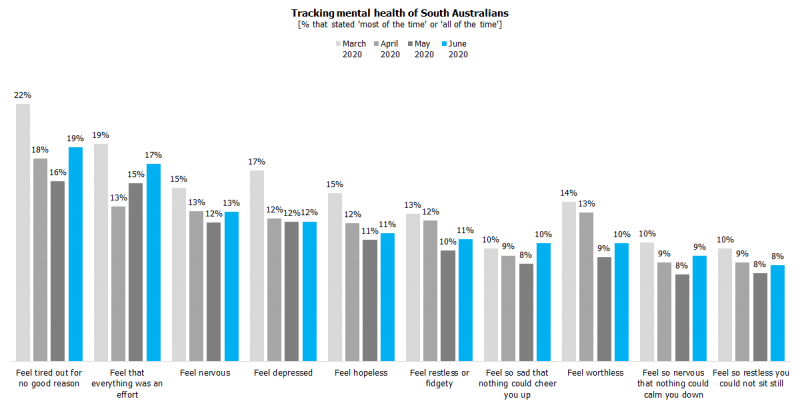
Interestingly, 18 to 34 year old’s continue to experience these anxiety aspects more commonly than any other age group, while those aged 65+ are least likely.



…..
Financial security personally and for others, be it realistic or even a dose of optimism bias, tends to drive spending. In times of low confidence and financial security for themselves and the broader economy, spending tends to contract, as the general population prepares for an uncertain future. This likely impacts discretionary and impulse spending, yet particularly planned expenditure such as travel, cars, real estate, renovations and other larger items critical to stimulate economic vibrancy and maintain employment.
As South Australia feels less anxious about the health fears associated with COVID-19, the economic fears will steadily grow. From the above data, younger South Australians have a stronger financial security and confidence, and likely appetite for spending than their older neighbours. This is worth considering in the marketing, product development and other strategies required for local businesses to survive and prosper as world-wide economic instability continues.
Square Holes is seeking a small number of partners in the mind and mood research we have been conducting to help make sense of the impact on South Australians.
